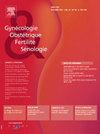[法国对配子捐献候选人进行 CFTR 基因变异筛查:哪些适应症?如何筛查?为什么?]
IF 0.6
4区 医学
Q4 OBSTETRICS & GYNECOLOGY
引用次数: 0
摘要
目的:根据法国的建议,只有卡里型基因检测才是配子捐献候选人的第一线检测。只有在出现呼叫点的情况下,才建议对导致严重单基因疾病的变异体进行额外的基因检测。然而,囊性纤维化仍是最常见的遗传疾病,会对儿童造成严重后果。本研究的目的是评估囊性纤维化跨膜传导调节基因(CFTR)异常筛查中心(CECOS)的不同筛查策略:我们的研究基于对通过调查问卷收集的数据的分析。本研究不包括授权捐赠的私人中心:在 33 个受访者中,有 26 个中心参与了研究。2 个中心对所有精子捐献者进行了系统筛查,只有 1 个中心对卵细胞捐献者进行了系统筛查。其他 23 个中心则是根据个人或家族病史,在临床上有强烈怀疑时,以及在受捐夫妇双方中有一人有已知变异时,才进行研究。在使用的分子分析技术方面,56.5% 的中心使用商业试剂盒进行 PCR 分析,而其他中心则使用新一代测序技术:因此,与其他国家不同,法国仍在广泛开展有针对性的筛查。因此,与其他国家不同,法国仍在广泛开展目标筛查,但扩大系统筛查范围会带来伦理、财务和组织方面的问题。本文章由计算机程序翻译,如有差异,请以英文原文为准。
Dépistage de variant du gène CFTR chez les candidats au don de gamètes en France : quand ? Comment ? Pourquoi ?
Objectives
According to French recommendations, only the caryotype is carried out as a first line in candidates for gamete donation. The prescription of additional genetic tests for variants responsible for serious monogenic diseases is only recommended in the case of call points. However, cystic fibrosis remains the most common genetic disease with serious consequences in childhood. The purpose is to assess the different screening strategies in the Centres d’Études et de Conservation des Œufs et du Sperme humain (CECOS) regarding abnormalities of the Cystic Fibrosis Transmembrane conductance Regulator gene (CFTR).
Method
Our study is based on the analysis of data collected using a questionnaire. Private centres authorised to donate have been excluded from this work.
Results
Twenty-six centres participated out of the 33 interviewees. Two centres carry out systematic screening in all their sperm donation candidates while only one centre practises it in its oocyte donation candidates. For the other 23 centres, research is carried out in case of strong clinical suspicions according to personal or family history and when one of the two members of the recipient couple has a known variant. Regarding the molecular analysis technique used, 56.5% of centres use PCR with commercial kits, whereas the other centers use next-generation sequencing.
Conclusion
Targeted screening therefore remains widely practiced in France unlike other countries. Moving to expanded systematic screening raises ethical, financial and organisational issues.
求助全文
通过发布文献求助,成功后即可免费获取论文全文。
去求助
来源期刊

Gynecologie Obstetrique Fertilite & Senologie
Medicine-Obstetrics and Gynecology
CiteScore
1.70
自引率
0.00%
发文量
170
期刊介绍:
Gynécologie Obstétrique Fertilité & Sénologie est un mensuel scientifique d''information et de formation destiné aux gynécologues, aux obstétriciens, aux sénologues et aux biologistes de la reproduction. La revue, dans ses éditoriaux, articles originaux, mises au point, lettres à la rédaction et autres rubriques, donne une information actualisée ayant trait à l''obstétrique et à la gynécologie et aux différentes spécialités développées à partir de ces deux pôles : médecine de la reproduction, médecine maternelle et fœtale, périnatalité, endocrinologie, chirurgie gynécologique, cancérologie pelvienne, sénologie, sexualité, psychosomatique…
 求助内容:
求助内容: 应助结果提醒方式:
应助结果提醒方式:


